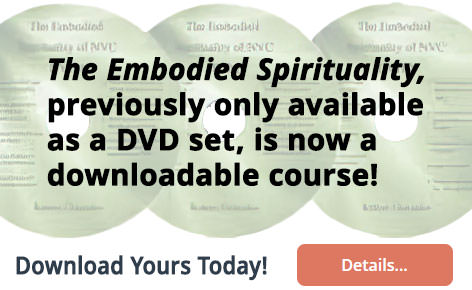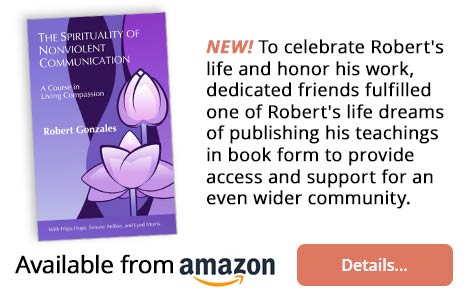

Welcome to the Robert Gonzales Training Legacy. Here you can learn more about Robert and the powerful teachings he dedicated his life to. NVC Academy is proud to house and share with you the complete body of his life's work. We invite you to explore, learn, and help keep his legacy alive!
Robert's passion was in the spirituality of the Nonviolent Communication (NVC) process. He saw NVC both as a process that helps people connect more authentically with themselves and others, and as a spiritual practice and way of living. The worldwide NVC community mourned when Robert died in 2021. He left behind a legacy of work that emerged from a lifetime of inquiry into the intersection between spirituality and human communication. More about Robert.
John introduces his Self-Connection Exercise as a mindful way of coming to awareness via OFNR. Breath: immediately observable, a reminder to observe. Body: feeling the body, awareness of sensations. Needs: an experience of wholeness that expands awareness of the totality of experience. Listen.
Details...Article
8 - 12 minutes
Here we explore variants of conflict patterns in part two (of this two part series) that include: refuting "straw man arguments"; not checking understanding, repeating unhelpful behaviour; repeatedly asking for what's already given; asserting rather than demonstrating responsiveness; assumptions; denying conflict exists; neglecting interdependence; stonewalling; absence of curiosity, humility, respect, empathy or care (even when reflecting).
Details...Article
6 -9 mins
To resolve conflict, information of what's important to each party, plus corrections, needs to be included and built upon. Here we explore nine patterns of ongoing conflict, including diagnosis; assuming understanding; refuting; unhelpful communication mediums; over focus on intent over effect; and “hit-and-run” engagement. This is part one of a two part series.
Details...Trainer Tip
1 - 2 minutes
Trainer Tip: When you make a request of someone, you don't diminish your relationship; you enhance it. If you receive a "no" to your request, consider brainstorming a different strategy that would meet your needs. It isn’t a sign of weakness to clarify what you would like. It helps you commit to living a full and joyful life. Look for opportunities to clarify your requests.
Details...Article
5 - 7 minutes
Codependency occurs when others' behavior affects us in unhealthy ways and we get obsessed with controlling their behavior. For example, we may focus on other's needs while neglect what matters to us, and resent it. Or we may depend on others to rescue us from results of our actions. Or we may fix or rescue others' neglected responsibilities. Or we may make others responsible for our needs. Instead, notice your needs, what you can('t) change, and your priorities.
Details...Trainer Tip
1 - 2 minutes
Trainer Tip: We all have different ways to meet our need for rest. It's important to notice when you need that time. You might know you need rest when you find yourself snapping at people on the phone, when you snap at your cat, or when you ignore your partner. Rather than behave in ways that you might regret, consider doing something that will help you meet your need for rest. Everyone in your life will benefit.
Details...Video
15 minutes
Mediation is a great skill to have whether it's for your personal relationships or in the workplace. We look at four different techniques and their benefits in a role-play between two neighbours discussing a dispute.
Details...Article
5 - 8 minutes
Struggling to say "no"? Here are ways you change your adjacent mind patterns. First, note the differences between those who respect boundaries and those who often don't. Second, review situations in which you lost track of your choice. And rehearse what it would sound, look, and feel like if you kept connection to your choice. Third, seek validation of your experience - from a grounded and mindful (non-reactive) state.
Details...Practice Exercise
4 - 6 minutes
Marriage can be seen as a limit on freedom. Ideas of compromise collude with this view. Instead, notice when your "yes" to your partner is laden with obligation, duty, guilt, fear, or an attempt to win love or approval, and how it's not a truly free "yes". True freedom is different from compulsion, and doesn't conflict with other needs. When have you experienced true freedom? What conditions support your access to freedom?
Details...Practice Exercise
5 - 8 minutes
Notice situations where you're attending to another and giving up on your needs with resentment or a sense of submitting. You can also watch for “shoulds,” obligation, and black-and-white thinking around the support you offer. Is there a sense that if you don't carry out a particular action something bad will happen? If so, identify the needs at hand and brainstorm a variety of strategies to meet them.
Details...

